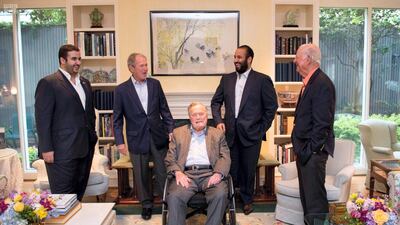Saudi Arabia's ambassador in Washington has set out evidence of Hezbollah's deep involvement in the war in Yemen, including footage of commanders directing training for Houthi rebels.
Prince Khalid bin Salman used a Twitter thread to show documentary evidence that the Iranian-backed Lebanese group was overseeing units of the Houthi militia that ousted the country's internationally-recognised government.
Last month Michael Knights, a senior fellow at the Washington Institute for Near East Policy, told The National that Hezbollah fighters in Yemen appeared “to be employed in Yemen in much the same way they were in Iraq” following the fall of Saddam Hussein's regime.
"In Iraq, they were an Arabic-speaking unit that advised local militias to make them more organised and capable, [and in Yemen] the Houthi tactics on the northern front are highly reminiscent of Hezbollah tactics on the Israeli border", Mr Knights told The National. These include, he said, use of anti-tank guided missiles, snipers and battlefield tactics.
_____________
Read more:
Gargash: Al Qaeda in Yemen is weaker than ever
UN's Yemen envoy warns against allowing war to drag on
_____________
The Saudi ambassador revealed that Hezbollah was training a loyal cadre from among the Houthi ranks. The Yemenis were not only taught military skills but were seen shouting slogans of loyalty to the Iranian leadership.
Hezbollah has long perfected effective techniques of insurgent warfare, including of hit-and-run attacks.
“Hezbollah may also supplement Iranian advisors for strategic systems such as drones, long-range rockets, and anti-shipping missiles”, Mr Knights said. There was no indication of the size of the Hezbollah contingent in Yemen.
The Saudi diplomat said there were “ideological and military” links between Al Houthis, Hezbollah and Iran. Teheran has used Yemen and the civil war in the wake of the Houthi uprising to attack the neighbouring states and the oil lanes of the Red Sea as well as threaten regional security.
Yemen’s government and its ally believe Iran is using its backing for the Houthis to transform the Yemeni militia into a replica of the heavily armed Hezbollah movement in Lebanon. As both a military and political movement Hezbollah wields great influence in Lebanon. Iran denies interfering in Yemen.
Meanwhile efforts to bring the warring side to the table are coming to a head. The United Nations invited Yemen's government and Houthi leaders to Geneva next month for talks on resolving the country's civil war, a spokeswoman said Friday.
"I can confirm that the Office of the Special Envoy sent out invitations to the government of Yemen and to Ansarullah," UN spokeswoman Alessandra Vellucci said.
Ansarullah, which means Supporters of God, refers to the Houthi rebels group that has been battling the Saudi-backed internationally recognised government in a conflict that has killed nearly 10,000 people since 2015.
The UN's Yemen envoy Martin Griffiths has said the talks due to open on September 6 will be aimed at charting a path forward to revive UN-backed negotiations which broke down in 2016.
Yemen's government has said it has low expectations for the talks, blaming the Houthis for refusing to make concessions.
The UN has repeatedly described Yemen as the world's worst humanitarian crisis.


